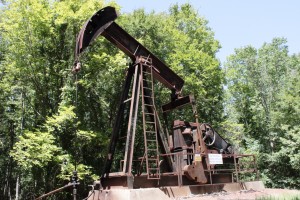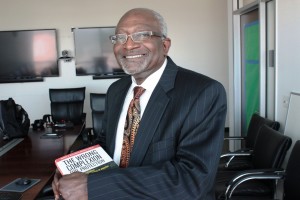The Father of Environmental Justice Sees Danger in How Texas Regulates

Dave Fehling / StateImpact
As oil and gas production and processing increases, who wins and who loses in Texas?
Texas Land Commission Jerry Patterson told a political luncheon in Houston that “oppressive federal government regulation” was a big threat to the Texas energy economy. Especially pollution regulation by the U.S. Environmental Protection Agency.
“And more specifically, (by) the U.S. Wildlife Service and their Endangered Species designations for critters that probably ought to die anyway,” Patterson said, referring to federal efforts to protect species including salamanders, lizards and prairie chickens. The designations could restrict oil & gas drilling in West Texas.
Come to Texas
It’s an anti-regulation stance repeated by the state’s top officials including Governor Rick Perry. Perry has used radio ads to try to lure businesses from other states to Texas where he said there is “limited government” and a “pro-business environment.”
Winners and Losers
But if that helps people in certain industries, does it hurt other people (or critters)? It’s an issue at the heart of one researcher’s lifetime of work.

Dave Fehling / StateImpact
Dr. Robert Bullard is known as the Father of Environmental Justice
“We don’t need less regulation. Less regulation and looking the other way will give us disaster,” said Dr. Robert Bullard at Texas Southern University where he’s the dean of the Barbara Jordan-Mickey Leland School of Public Affairs.
Bullard has written extensively on the role race and social class play in where industrial facilities are located. He has been recognized nationally as the “Father of Environmental Justice.”
“The environmental justice movement has been advocating for more than three decades we need stronger regulations, we need stronger enforcement, we need a strong EPA,” Bullard told StateImpact.
Bullard’s work in what became a movement started in the 1970’s when he found a pattern of state-approved garbage landfills being located in predominantly black neighborhoods in Houston. He went on to raise concerns over how many public schools were located in close proximity to refineries and chemical plants.
Environmental and Economic Justice in a Changing Texas
With the drilling boom in Texas and the expansion of refineries and petrochemical plants along the Gulf Coast, Bullard foresees more Texans becoming aware that there’s a potential downside to what otherwise is helping Texas create jobs at an enviable rate.
“And among not just poor people but also working class and middle income people. And not just African-Americans and Latinos but also among Anglos who see their communities threatened by the drilling and by the fracking,” said Bullard.
“In reality, the people who live closest to these plants, these factories, these industries, who are on the fence line, they don’t get the jobs. They get the pollution and they’re also left with poverty. So you talk about economic justice and environmental justice, they are inter-related.”

